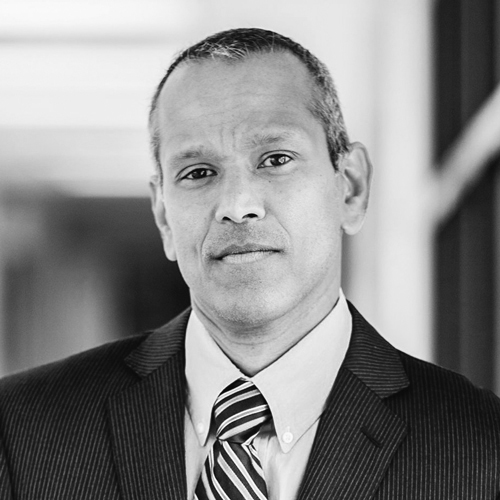
When Paul Neumann assumed the leadership of Trinity Health’s legal team in November 2009, he immediately set out to revamp it. Organized by region, Trinity Health lawyers reported to their regional hospital CEOs at the time, with little allegiance to the corporate parent. Each region attended only to its own needs, resulting in a disjointed structure. Neumann, however, wanted the legal team to be centrally coordinated so that the company’s 55 lawyers would spend part of their time working on issues for other regions and the corporate headquarters. In addition, he wanted to develop lawyers with specialized expertise in key areas of law, including employment, real estate, supply chain/purchasing, regulatory compliance, contracts with insurance carriers, and intellectual property.
This arrangement, he believed, would allow the organization to match the skills of each of its 55 attorneys to tasks that best suited their talents and experience. For example, an attorney well versed in regulatory compliance would spend 10–15 percent of the time on regulatory issues for other regions and for the corporate parent. Trinity Health would thus reap the benefits of the attorneys’ specialized expertise across the entire organization by allocating work according to ability instead of geography. That strategy would also reduce the need for outside counsel.
Six years later, the initiative has proven successful. Following Neumann’s reorganization, Trinity Health’s legal department has boosted its internal client satisfaction while cutting costs by reducing the use of outside counsel. The guiding vision to obtain those results was a transformation of the organization’s independent regional legal teams into a more cohesive whole that shares expertise and resources.
“I immediately went on the road and told people that we would do this within six months,” recalls Neumann, who today serves as executive vice president and chief legal officer for the Livonia, Michigan-based organization. His proposal demanded a change in cultural mind-set for the healthcare giant, which has grown by numerous acquisitions. After a 2013 merger with Catholic Health East, Trinity Health now consists of 85 hospitals, 52 continuing-care facilities, and 44 home-care agencies in 20 states.
Leading up to the restructuring, regional CEOs were hesitant to give up some control over their law teams, but Neumann persisted. “I said to the CEOs, ‘If it doesn’t work, we’ll try something else,’” he says. Neumann’s salesmanship won over the organization’s leaders, who probably wonder today why they had any misgivings. Internal surveys of legal services with satisfaction scores of four and a half out of five are proof of success.
However, the transition didn’t come without its challenges. Some attorneys were not comfortable with the change. “Under the new model, you have to be a counselor, not just a lawyer,” Neumann explains. A handful of attorneys weren’t interested in engaging on strategic issues and wanted to focus exclusively on legal matters. These staffers were let go. “They were better served working for law firms,” says Neumann, adding that he has kept in touch with some, and they are happy with the change. Neumann hired attorneys experienced in desired specialties to fill the voids.
“I tell our managers that if you want fast response and innovative work, you have to get us involved early on every project—and not just have us paper over a deal after it’s been set”
Today the results of the revamped department are clear—faster, better quality work at about one-third of the cost, compared to the previous organizational model. The quality boost stems partly from a new culture that promotes sharing institutional knowledge.
For example, attorney A, who is working on a contract with a supplier in one region, may reach out to attorney B, who once negotiated a contract with the same supplier in another region. The advice from attorney B, who checks in with purchasing personnel on the performance of the supplier, can help attorney A to tailor the contract more favorably.
While upper management is thrilled with the cost savings resulting from legal’s reorganization, the higher-quality work would itself be enough justification, Neumann says. In order to fully realize the benefits of the new arrangement, however, legal must be integral to deal making.
“I tell our managers that if you want fast response and innovative work, you have to get us involved early on every project—and not just have us paper over a deal after it’s been set,” he says.
Regions still operate independently to a large degree. It’s the best of both worlds because, when needed, regional lawyers can lean on the support of the entire corporation. “Paul respects the judgment and autonomy of those of us out in the field,” says Stephanie Westermeier, who serves as general counsel at Saint Alphonsus Health System, based in Boise, Idaho, and managing counsel for CHE Trinity. “We have the ability to work with and learn from other lawyers in the system. Where it makes sense, we can standardize our approach across the board and can gain efficiencies.”
There will be plenty of work to keep Trinity Health attorneys busy in the foreseeable future, as the organization continues to grow and is proactively pursuing partnerships with healthcare entities—urgent cares, pharmacies, physician organizations, continuing-care facilities, and hospitals. Last year, Trinity Health partnered with the Heritage Provider Network to expand population health management, with Sharecare accelerating consumer and patient engagement and with Walgreens enabling retail clinic collaborations, outpatient pharmacy services, and expanded prescription and disease-management programs that can help improve people’s health while increasing consumers’ access and lowering overall healthcare costs.
Like a law firm within the parent company, the legal department will step up as needed, using the resources best suited to make deals go smoothly. It’s a new, cutting-edge model that will allow Trinity Health to readily meet the challenges of the fast-changing healthcare market.


